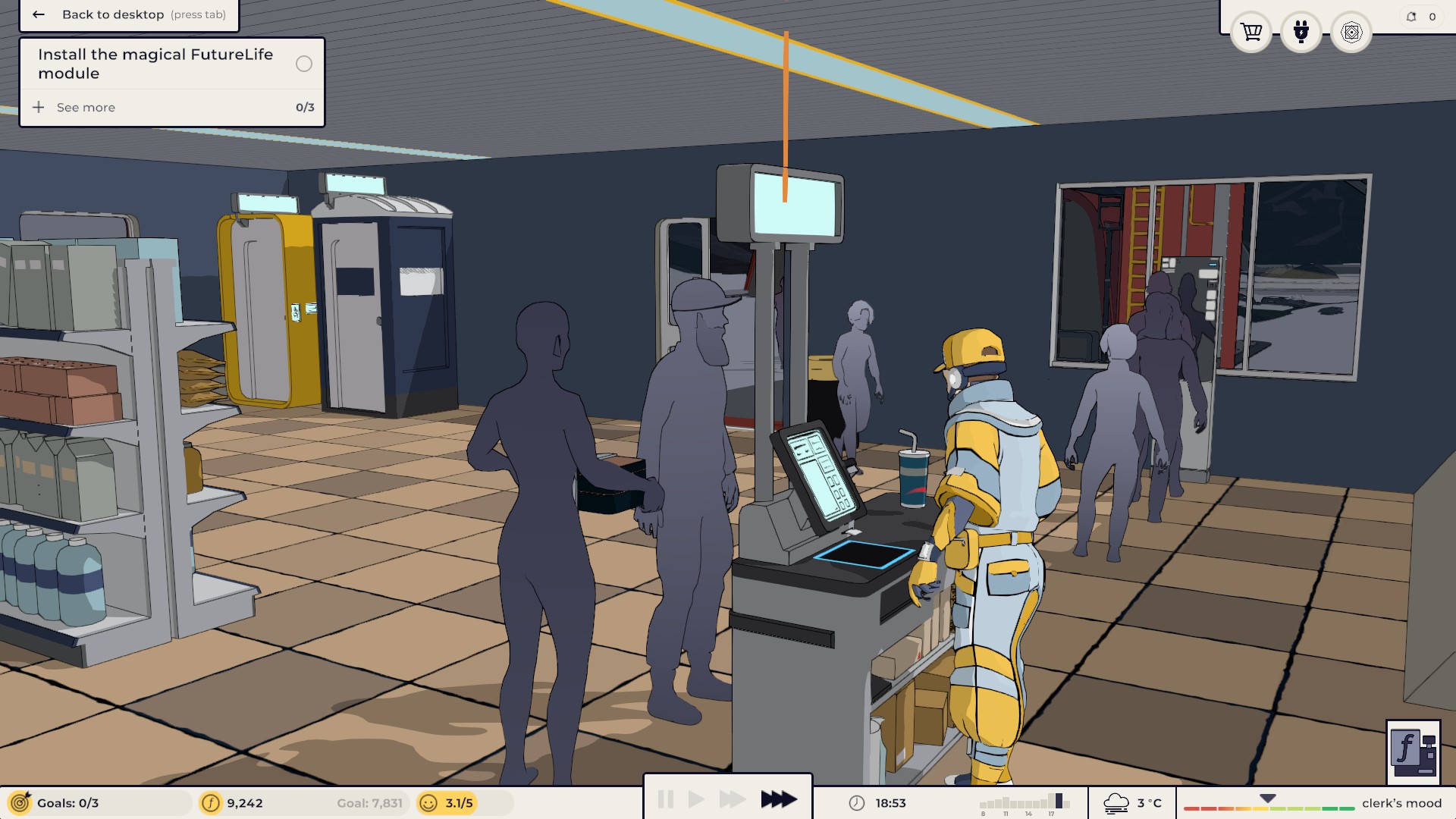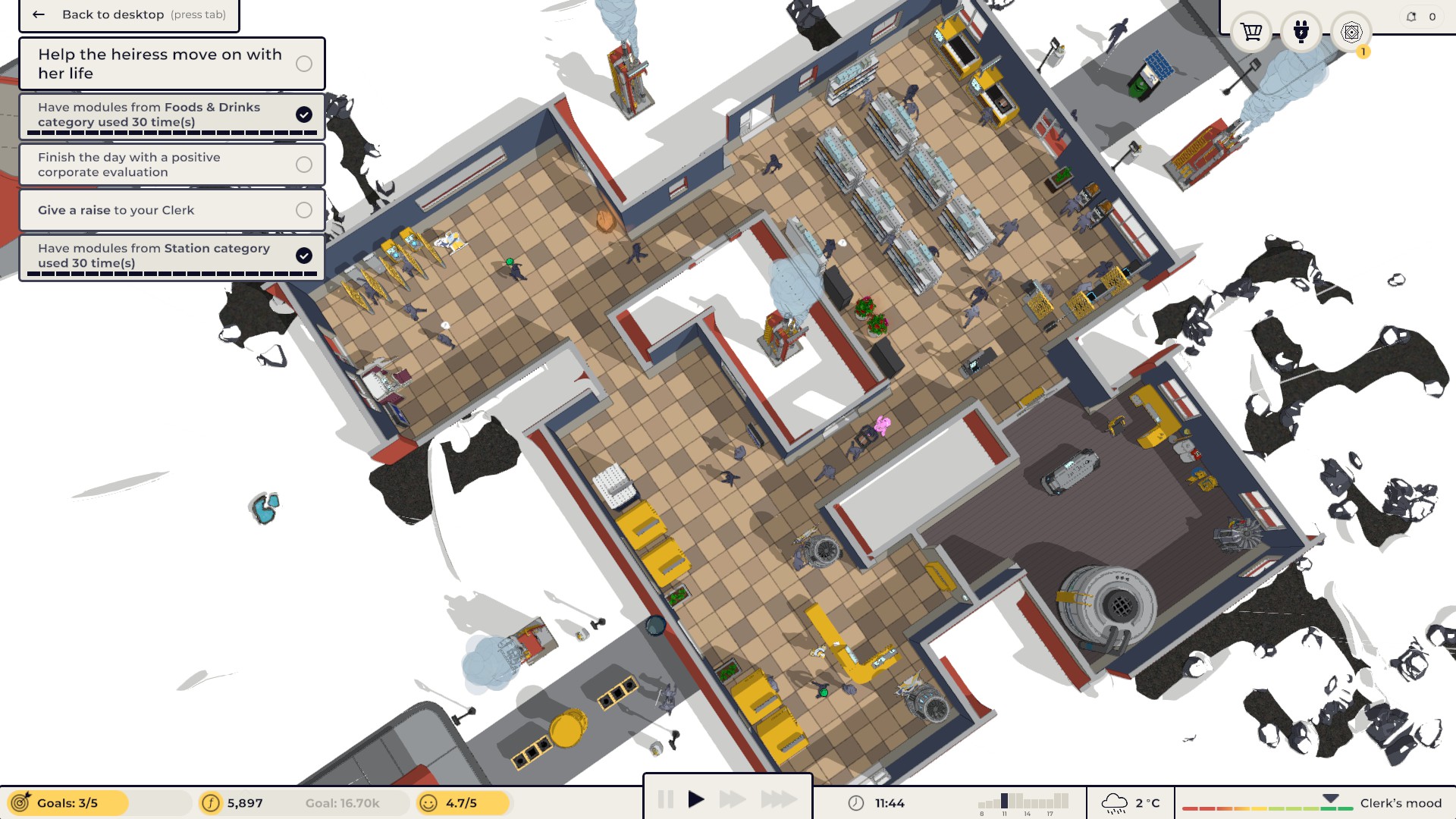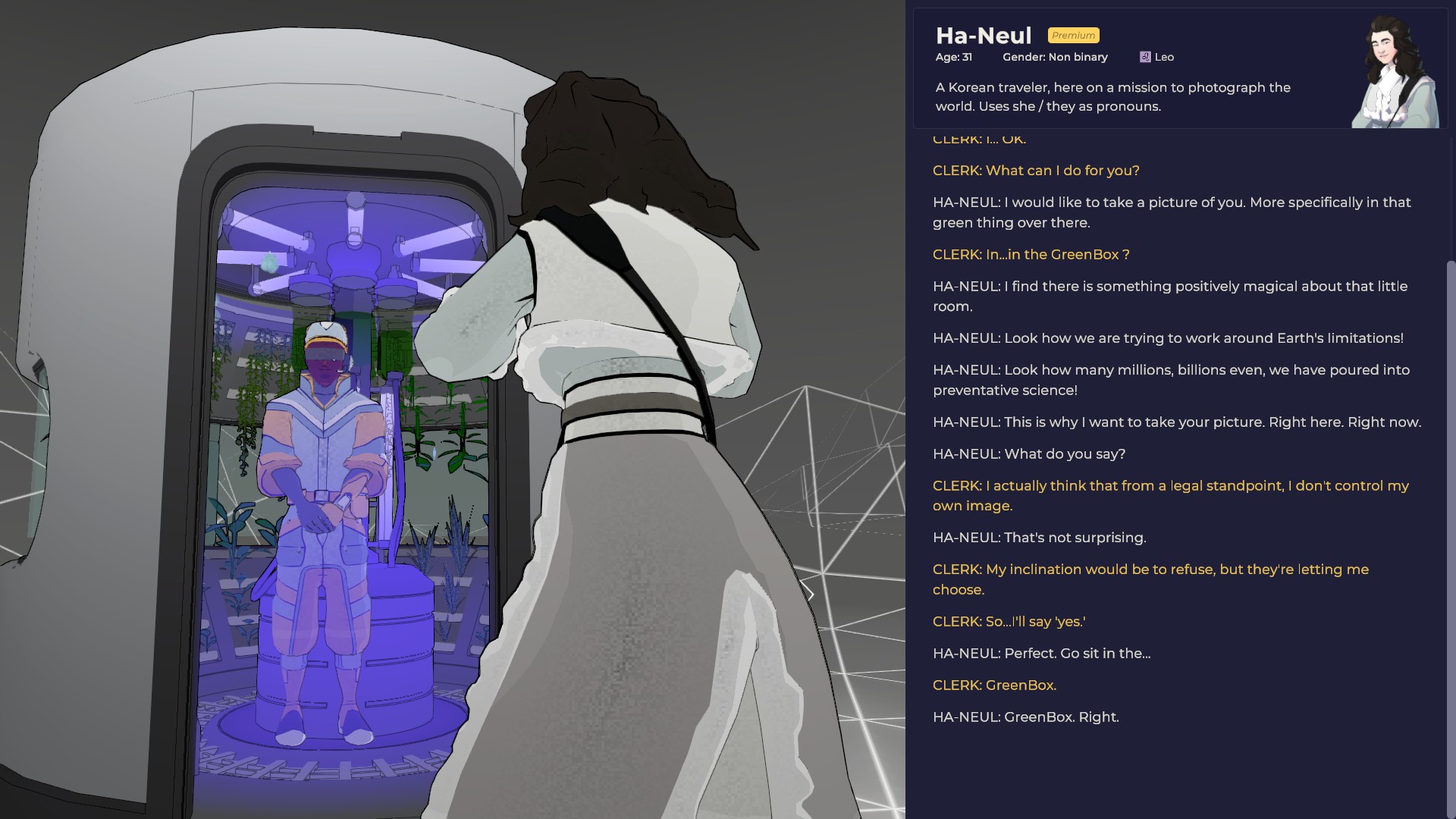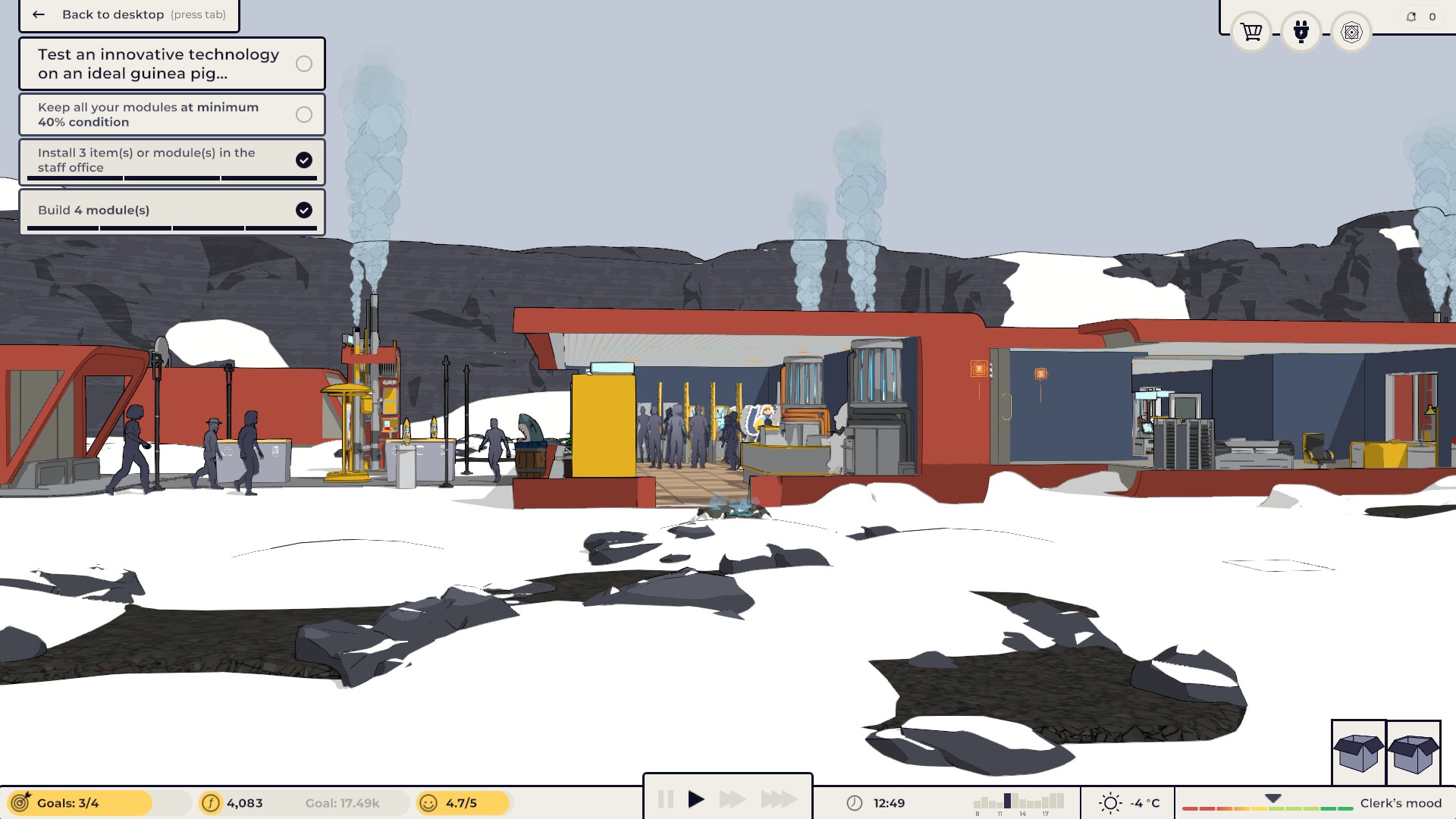Our Verdict
While it doesn't fulfil its potential, Flat Eye is an intriguing management sim that's more than the sum of its parts.
PC Gamer's got your back
What is it? A gas station management game
Release date: November 14, 2022
Developer: Monkey Moon
Publisher: Raw Fury
Reviewed on: Nvidia GeForce GTX-970, Intel i7-4790K, 16GB RAM
Multiplayer? No
Link: Official site
A lot of management games, whether they are as large in scale as SimCity or as small as Two Point Hospital, often operate on the premise that the only thing holding back the capitalist system is efficiency. With the right management (that's you), everything can run perfectly. It's an appealing fantasy but neglects the contradictions inherent in the pursuit of profit. The corners that must be cut and sacrifices that must be made to ensure the numbers keep going up. Flat Eye isn't an especially great management game, but it is more interesting than many of its peers. It centres the tension between the desire for a perfect system and the contradictory needs of that system, producing something more than the sum of its parts.
A remote manager working for the titular Flat Eye corporation, you'll oversee the running of a pit stop in Iceland. Customers come to fill up on fuel and do a bit of shopping. Like the best/worst conglomerates, Flat Eye uses one business to prop up many others. They come for gas, they buy some groceries. Maybe a coffee. Sooner or later this little depot is going to offer everything imaginable from instant meals to medical consultations. Why settle for one corner of the market when you can have it all? After all, Amazon started out selling books but grew into... well, everything. Corporations have bottomless appetites and Flat Eye has you constantly chasing expansion, new ways to exploit customers and new sectors of business to seize.
Niceland

It's a charming little place, admittedly. The cold of Iceland makes your depot seem like a little cosy haven. The lo-fi visual style presents an unassuming dystopia, with bright colours and clean design. I enjoyed tinkering with layouts, right down to installing little partitions between self-service checkouts or putting welcoming cardboard cut-out characters next to my personal data hoovering self-help booths. Even knowing I was a lackey for what might as well have been the Weyland-Yutani corporation or Walmart, I still drew satisfaction from expanding it.
Your pit stop is handled by a single clerk you micromanage, queuing tasks for them and ensuring they keep shelves stocked and all the shop's modules working. At first this is a straightforward and frankly dull task. Yet once the services offered by your little pit stop grow, you get a fair bit more to think about. You have to create devices and services which complement each other, while maintaining three primary resources: power, biomatter and data. For instance, you’ll be using biomatter—excrement—from a smart toilet to turn into food. Something I’m certain won’t be in the commercials. Both devices require power provided by geothermal generators (an Iceland exclusive), and the smart toilet can also supply data to the self help booth. Different modules have different needs so you'll need to keep them overlapping to have a functioning station.
It's not especially difficult, but as space or money become limited you have to prioritise. Do you innovate? Do you focus on shovelling as many people through checkouts as possible, maximising sales? Or do you branch out, splitting your store up to generate revenue from dozens of different services?

No matter which you choose, it's quickly apparent how stretched thin this one employee is. Self-service checkouts break down comically fast and most other devices fare little better. A simpler game would allow clever placement to compensate for this. Flat Eye is not that game. Instead, no matter how devious you get, it's simply impossible to stop things breaking or keeping customers happy. At least, not without running your employee into the ground.
Exhaustion is not the only threat to your employee's health. They will get injured. They might die. Repairs come with increasing risks of accidents and your clerk can meet an unfortunate end suddenly. Which, in terms of the game's systems, doesn't really matter. You can just hire someone to replace them. Business moves on. Humans are just fuel for the corporate engine. The whole sequence of events from death to hiring is conveyed through cutesy corporate pop-ups because there's nothing corporations can't repackage to clean up their image.
They will get injured. They might die.
While the visuals and design convey Flat Eye's themes well, the explicit chunks of narrative feel much clumsier. Throughout the game, premier customers—bespoke NPCs who your clerk can speak to—will enter the station. In these encounters you can continue to micromanage your employee or let them choose what to say. These moments largely consist of eccentric individuals spouting exposition on their views of Flat Eye or the declining state of the (modestly) alternate 2022 where things are (slightly) worse than our world. The writing is a little flat and none of the dialogue options are ever particularly exciting. Worse, while having disposable clerks serves the game's larger themes, it leaves these narrative sequences without any kind of anchor. The clerk isn't much of a character—certainly not one you can invest in—and none of your interactions ever really seem to shape outcomes.
These customers can be somewhat interesting, but by and large they're too thin to be compelling: a variety of archetypes who you can read like a book. Their appearance and interactions are largely tied to the introduction of new services or items in the depot, seemingly intended to offer additional context for each device. Instead they spell out information that would have been better off subtle and understated. The uneasy sense of what's really going on is far more affecting than a disgruntled eco-artist coming along and telling you “corporations are bad”. It trades in nuance for… well, I'm not sure it gains anything in that transaction. It's a shame because narrative segments to break up the monotony of management is a good idea, it's just let down by how dull these sequences are.
Artificial negligence

Along with these human NPCs, you'll have to deal with the AI that secretly runs Flat Eye as it attempts to steer you towards its goals—big goals, involving the future of humanity. Not nefarious at all. Sequences where they monologue over a presentation they're using as a cover for speaking to you were a novelty initially, but they quickly became obstacles that I was hitting the skip button to move past.
There's also a messaging service inside your manager desktop interface where you can speak to other people within the company. These chats are a bit more interesting simply because there's more at stake. You can hurt or upset people, your limited dialogue choices painting you as someone at best oblivious to the exploitation around them or worse, complicit. When a colleague expresses they don’t understand how you’ve quickly risen above them despite being so new to the company, you’re able to posit luck as a cause or simply argue that it’s all just a meritocracy. No matter what you choose, you can’t really help this colleague with their circumstances. You benefit from the power structure but have very little power yourself. Even then, these dialogues are not nearly as impactful as the management portion of the game because, again, they spell out what is much more effective when left unsaid.
Long term, Flat Eye definitely has its issues. To motivate you (or provide an opportunity to rebel) you are assigned quotas each day. Along with customer satisfaction and income, these quotas affect your daily performance review. The better you do, the sooner you can acquire new technology and upgrade your station. Even at my most focused, progress was quite slow and new ideas weren't introduced nearly fast enough to stave off boredom. In trying to emulate similar games for satirical purposes, to lay bare the realities often shut out of these titles, Flat Eye forgets to emulate the depths of their management systems.

Flat Eye's systems serve its narrative well enough for a few hours, but eventually tedium wins out. All the busywork did make me feel like a clerk managing a haphazard store, but having done this kind of job for real, I wasn't very excited to go back to all these rote tasks. Even as it furthers its themes, your depot inevitably spiralling towards calamities due to profiteering, Flat Eye fails to present an engaging hook past its initially effective commentary. It runs out of things to say long before its story comes to a close, leaving players with a fairly simple little management game that doesn't offer enough customisation or systems to tinker with to generate anything fascinating in its own right.
I absolutely sympathise with Flat Eye's narrative goals, and in many ways it does succeed. It’s just a shame that those effective devices are undermined by lacklustre writing and NPC interactions, or through the decline of its core gameplay loop into a bit of monotony. For a good portion of its length, though, Flat Eye compelled me to keep tinkering with my little gas station. The vibes are potent enough that I can recommend it, with some notable caveats. If there was more depth to its management systems, Flat Eye could have overcome its narrative shortcomings; and with more engaging dialogue sequences, it could have compensated for its basic structure. With both, it could have been something extra special.
All that said, I liked Flat Eye. Even with the unfulfilled potential, I still enjoyed crafting my little pit stop in the middle of nowhere. There's an amusing, darkly funny corporate business simulator in here, despite what it lacks in real narrative intrigue. The daily grind will just, inevitably, get you down.
While it doesn't fulfil its potential, Flat Eye is an intriguing management sim that's more than the sum of its parts.


